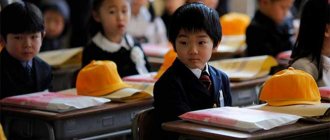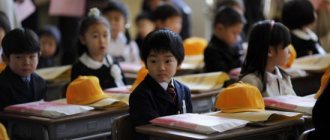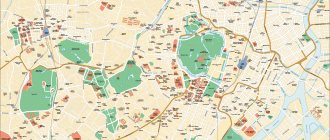Author: Sergei
05 March 2021 19:13
Tags: Japan school
56621
16
One of the important responsibilities of children is to attend school. Although many children complain about having to wake up early and do homework, education is an important stage in everyone's life. In Japan, for example, there is a certain set of rules that are different from what we are used to. Here are a few of these rules that you may not have known about.
0
See all photos in the gallery
Legalization of teacher's work
Official registration begins with a successfully completed interview and the conclusion of an employment contract. Then the Japanese side takes up to 3 months to process a work permit for a foreign citizen. It is issued by the Immigration Bureau
, and the employer sends it to the future employee. Shipping and processing costs are paid by the employer.
The next step is to obtain a work visa from the Japanese consulate, which is open for a specific type of activity. You will need the following documents:
- A valid foreign passport.
- Passport of a citizen of the Russian Federation.
- Color copies of both passports.
- Correctly filled out visa forms - 2 pieces.
- 2 photos 3.5-4.5 cm.
- An invitation from the employing company on letterhead with a stamp.
- Work permit sent by the Japanese side.
- Certificate of good conduct.
The current epidemiological situation in 2021 may be the reason that you will be asked to take a coronavirus test or collect additional medical certificates. However, it is better to discuss this issue in detail during the interview.
Visa processing may take about a week or less. When crossing the Japanese border on a work visa, you need to register with the police and obtain a temporary residence permit.
Permanent residence is allowed only to those who have been in the country for 10 years, for Japanese spouses - from one to 5 years.
In order to avoid becoming a victim of force majeure, we recommend having some cash reserve on your card - $2000-5000 - to feel more confident.
Working conditions
After a successful interview, as a rule, they call within a few days and ask where to send documents to obtain a work visa.
- The work schedule depends on the place of teaching - there is part-time work with a couple of lessons a day, there is a classic schedule from 10.00 to 19.00 with a lunch break. Standard working hours in public schools: from 8.40 to 14.40 5 days a week (additional elective classes or busy Saturdays are possible) and remote work .
- The minimum vacation is 10-14 days + all public holidays (in some institutions in August the teacher goes on unpaid leave).
- Many language schools can arrange an internship of 1 to 4 months with partial or no payment.
- Preparation and planning of lessons occurs after lessons, but, as a rule, this is included in the workload and is paid.
- In some schools, teachers may be required to conduct creative activities in the creation of which students take an active part.
- Payment for a month of work in a public school for a beginner starts at $1,500 and eventually reaches $2,500-4,000. However, in most cases, a person’s personal data, his experience, education, and certificate availability are taken into account.
- Typically, the employer pays for health insurance and travel expenses, and in some cases provides housing assistance.
- The salary is increased gradually, which is associated with gaining work experience (a beginning specialist with a higher education receives about $1,500 and increases every few years). On average, salaries grow by 4% per year.
- Diligence and exceeding the plan will be positively assessed by management in the form of bonuses.
The main challenges may be due to markedly different company ethics, which should be carefully reviewed before relocating. It can be difficult for people from the CIS countries to clearly and patiently follow all the rules, regulations, and traditions. In Japan, a person who works overtime is respected, and laziness is severely punished, including dismissal.
Success awaits those who are ready to work without raising their heads, then they will be able to gain experience, earn positive feedback from management, and make savings.
What should you be prepared for?
The most important difficulties that an English teacher in Japan may encounter are related to the following factors:
- The need to learn Japanese for career growth and future living.
- The cost of living is very high (prices for housing, food, things are much higher than in Russia).
- Strict taxation system: if your income does not exceed $18,500, the tax rate is 5%. If the amount of annual profit is greater - 45%.
- Annual mandatory medical examinations.
- Long search for the first job.
- Unusual overtime - a standard week includes 40 hours of core activity, but in some areas overtime work reaches 15 hours weekly.
- The academic year is divided into trimesters and begins in April.
- The education system is subject to constant shuffling - your class can be changed at any time.
- Difficulties with buying business clothes for tall and overweight people.
- Possible unusual climatic situations (earthquakes, etc.)
Education in Japan: interesting facts
Japanese schoolchildren: UGC Education is the main value and the key to a person’s success in the modern world. Each country has its own training model. It has original national features. Let's talk about how education works in Japan, because it is one of the most economically developed countries.
The search for successful training models continues. The world is entering a phase where American and Scandinavian liberal democratic systems of knowledge transfer are becoming a thing of the past. They are giving way to models created in Asian countries.
In this regard, the most interesting is the education system in Japan, which maintains a balance of rigor, control and support for talented and capable children.
In addition, this is one of the models in which the principle of competition dominates, which ensures a rapid increase in the value of knowledge and skills, and accordingly, it contributes to progress.









